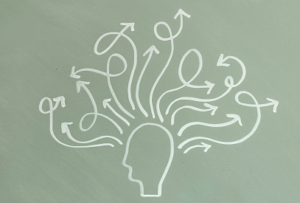
Serious childhood behavioural issues are now one of the greatest challenges for our generation. When I grew up, these behavioural issues were like Kombucha or avocado; heard of, but pretty rare.
They now exist in epidemic proportions. Something has clearly changed. A dramatic increase in processed diets and a decline in home cooking has undoubtedly changed the chemical mix hitting the brains of young children. A fixation with digital devices and an increasingly sterile, indoors-only environment must also play a role.
So it pends the question,
What is ADD and ADHD? Why are there so many children and families suffering through these issues?

Many of us will often wonder whether bouts of procrastination, falling short of our work or personal goals, inability to get things done and feeling easily distracted might be down to a little more than fatigue, poor motivation and a busy schedule. We all fail to be super sharp all the time, but ADD and ADHD represent a step further; these are concentration issues that grind life to a halt in a practical sense.
Attention Deficit Disorder is fundamentally an issue with concentration; fixation on tasks is fleeting, things do not get completed and there is resulting procrastination and stalling.
Attention deficit hyperactivity disorder has all the concentration issues but also a hyperactivity component. This can be extremely difficult for parents and teachers to deal with and involves constant mobility and running around, breaking and throwing things and generally being a bit of a ‘handful’ for those supervising.
ADD tends to present subtly with concentration issues; it can take a while to pick it up. Meanwhile, ADHD is clear and dramatic with overt and traumatic antisocial or disruptive behaviours.
In children, the diagnosis of ADHD often arises after clear problems at school which are then communicated to parents. Issues with attention often manifest as difficulties completing tasks, organising the steps needed to complete a task, not concentrating long enough to see the job through and generally performing poorly. These describe the attention symptoms that may be deficient in ADHD.
Some children will have issues regarding outbursts, talking excessively, running around the room, never able to sit still and if this seems excessive or to be causing trouble and this can certainly describe the hyperactive or impulsive symptoms of ADHD.
Generally speaking, if it is clear that there are issues with attention or hyperactivity likely being present before 12 years of age, lasting over 6 months, in two or more settings such as school and home and sufficient to cause problems with social or school functioning; then formal testing for ADHD should be considered.
Adults can certainly get ADD, although it looks different. A careful discussion with your doctor can get you started in the right direction towards discovering if you would benefit from treatment.
For a broad overview on brain function, please read ‘The body and the mind’. The same concepts apply for ADD and ADHD as they do to the rest of the brain
What are the attention deficit disorders?
ADD and ADHD are fundamentally conditions of neuroinflammation; attack of the nerve cells. Furthermore, ADD and ADHD are often treated with medication but the fundamental cause is the environment. This includes a profound and unavoidable role of the gut microbiome.
The gut is host to 100 trillion bacteria. They not only occupy the space but are completely metabolically active with our body. They digest our fiber and provide vitamins, produce hormones (including for the brain) and nourishing anti-inflammatory compounds.
Sometimes, the wrong gut bacteria take hold. This is especially the case with a highly processed, ‘packaged’ diet instead of home cooking. The gut evolved to eat natural food; a reliance on supermarket diets will provide food that is chemically different to real food. The digestive system simply cannot break down all the chemical preservatives and the lack of dietary fiber will mean that good gut bacteria diminish.
In these conditions, bad bacteria take over. They are notorious for producing toxins such as Endotoxin or D Lactic acid. These compounds not only attack the liver but go straight to the brain where they are toxic to good neurotransmitter production.
It is no wonder that children hooked on sugar, simple carbohydrates and similar packaged foods are suffering behavioural issues. They are swamped in toxins.
As medicine becomes more comfortable with a holistic approach, the message is slowly being heard. Naturopaths have been talking about the gut and the mind for centuries!
It is now possible to perform a whole gut microbiome test and identify culprit bad bacteria that are associated with ADD and ADHD.
This article runs through the basics of ADD and ADHD, but please read further on the relevant health topics by clicking the articles below:
- The mind and the body
- Gut microbiome (dysbiosis)
How do the attention disorders develop?
Attention Deficit Disorder and Attention Deficit Hyperactivity Disorder are common behavioural and concentration issues which are increasingly being identified in the community.
The exact cause is unknown however, it represents a form of brain inflammation and dysfunction and likely has multiple causative influences.
Some of these may include…
- Methylation issues
- Sleep deprivation
- Dysbiosis and toxicity from an overgrowth of sugar-loving microorganisms
- Neurotoxicity (inflammation of the brain)
- Hormone imbalances
A holistic integrative approach will help manage any underlying factors, however a multidisciplinary approach to treatment is the gold standard of therapy. This may involve psychiatrists, learning needs experts, teachers, family, speech therapists, nutritionists and psychologists to name a few.
The impact of ADD/ADHD on individuals and families cannot be understated and so patients are advised to get help if they are concerned.
How are the attention disorders diagnosed?
The diagnosis of ADHD in both children and adults is not a one size fits all activity. Generally speaking, it will start with having a discussion with your doctor to establish a few patterns.
Have the symptoms likely been present from childhood in some form?
Are the behaviours of concern ‘out of keeping’ with the norm? (standardised questionnaires are used to assist this stage of the interview) aka do they cause distress or catch other people off guard?
Are there more than 5 of these symptoms?
Do these behaviours cause poor outcomes?
Is there another medical or psychiatric cause of the symptoms such as depression, stress, anxiety or fatigue?
Are there any comorbid conditions such as depression or anxiety?
During this interview, it is best to have family members present to help build a history and also to complete online questions to help your doctor form an opinion.
A common difficulty for doctors is deciding whether the symptoms are typical of ADHD or not. ADHD tends to apply more to individuals who struggle to keep a job, have multiple driving offences, tend not to listen even when being spoken to directly, loses their keys or phone frequently etc.
Similarly, many of the symptoms of poor attention are also caused by other conditions such as:
- Poor sleep
- Stress at work or home
- Anxiety
- Depression
- Thyroid issues
- Obstructive Sleep Apnoea
- Relationship or personal difficulties.
Sometimes it can be very hard to distinguish whether ADHD is a factor and a trial of treatment may be helpful.
How are the attention disorders treated?
Evidence does suggest a benefit from the use of medications to treat ADHD as well as psychological therapies. Studies show between 30-80% reduction in severity of symptoms and many people will use these medications regularly or intermittently based on their symptom profile. There are two broad profiles of medications used:
Stimulants
- MethylphenidateRitalin: Short acting
- Concerta: Long acting
- AmphetaminesDexamphetamine: Short acting
- Lisdexampfetamine: Long acting.
- Vyvanse
These tend to have side effects such as: reduced appetite, difficulty sleeping, edginess, dry mouth, dysphoria and headaches. There are some suggestions that blood pressure can be raised in some people using these medications and so regular monitoring is worthwhile.
Non-Stimulants
- Atomoxetine
- Buproprion or Wellbutrin; Catecholaminergic antidepressant with some assistance in helping inattentive symptoms. Is also used for depression and may be a useful medication with or without stimulants
- Tricycylic Antidepressants
- SNRI class antidepressants
In general, the stimulant class of medications have shown better results in the available literature.
What are the non-medication treatments for the attention disorders?
The attention disorders result from the environment. There is a complex interaction between our environment to our brains; this includes our diet, the gut, microbes in our environment and pollution. A holistic approach is truly required.
Dr Ross’ approach to ADHD
The most common kind of child I see is a carbohydrate loving child. Hooked on processed foods, these children often refuse to eat anything nutritious. They will often become absolutely monstrous if they do not get what they want.
The toxins produced by bad bacteria living in their gut actually change the taste perceptions for these children; the bug is trying to get what it needs to fuel and grow. I have often wondered if fussy eaters are often children under the influence of the wrong bacteria sending signals to refuse their broccoli! Future science might shed more light on this.
Having once been bitten by a child demanding more chicken nuggets, a dietary assessment is now my starting point. This is followed by a medical assessment involving tests to prove what is going on.
Steps
- Get a clear diagnosis; is this an attention disorder?
- Perform blood tests, what vitamins are deficient, and what clues does this tell us about their liver and digestive system?
- What are their dietary patterns like.
- GI Map: What bacteria do they have living in their gut?Often it is not possible to simply change the diet; they will throw tantrums and make life unbearable. I prefer to start with digestive support to enhance the ability of the pancreas and stomach to kill the bad toxins.
This might include:
- Green tea extract
- Children’s probiotics
- Zinc supplementation
- Digestive tea (frozen as ice water)
- Protein substitute chicken nuggetsThe next phase is to directly start to kill bad microbes. This can be very hard in children as a lot of the supplements will be in tablet form. Specialist advice is needed for these cases.Finally, the objective is to restore brain health.
- Optimising B vitamin status (for methylation)
- Optimising GABA with good sleep hygiene, probiotics, Zinc, Magnesium and Vitamin B6
- Sleep hygiene: Melatonin liquid
- Liver support with lactulose to clear toxinsBy this stage, we may have enough improvement to change the diet. A crash change may be required.
This article touches the surface on the multiple things needed to treat. Of course, psychological and expert supportive help are required.
Broadly similar approaches are used in adult cases however it is easier to change the diet and use more aggressive supplements.
Conclusion
If you feel that your attention span is an issue, speak with your doctor. Tests can be conducted to see if it is likely that you have ADHD. A trial of treatment may be commenced, if safe, to help with symptoms.
References:Center for Disease Control; ADHD
https://www.cdc.gov/ncbddd/adhd/index.html
National Institute of Mental Health :ADHD Fact Sheet
https://www.nimh.nih.gov/health/publications/could-i-have-adhd/index.shtml#pub1
Bukstein MD (2019). Pharmacotherapy for attention deficit hyperactivity disorder in adults. In Brent, D (Ed.), UpToDate
Accessed 4th June 2019 via:
https://www.uptodate.com/contents/pharmacotherapy-for-attention-deficit hyperactivity-disorder-in-adults

